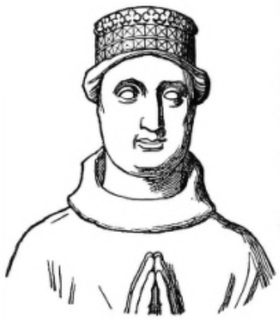Related Research Articles

John Holland, 2nd Duke of Exeter, 2nd Earl of Huntingdon was an English nobleman and military commander during the Hundred Years' War. His father, the 1st Duke of Exeter, was a maternal half-brother to Richard II of England, and was executed after King Richard's deposition. The Holland family estates and titles were forfeited, but John was able to recover them by dedicating his career to royal service. Holland rendered great assistance to his cousin Henry V in his conquest of France, fighting both on land and on the sea. He was marshal and admiral of England and governor of Aquitaine under Henry VI.
David Stewart was heir apparent to the throne of Scotland from 1390 and the first Duke of Rothesay from 1398. He was named after his great-great-uncle, David II of Scotland, and also held the titles of Earl of Atholl (1398–1402) and Earl of Carrick (1390–1402). He shares with his uncle and arch-rival, Robert Stewart, first Duke of Albany, the distinction of being first dukes to be created in the Scottish peerage. David never became king. His marriage to Mary Douglas, daughter of Archibald the Grim, the third Earl of Douglas, was without issue.

St Giles' Cathedral, or the High Kirk of Edinburgh, is a parish church of the Church of Scotland in the Old Town of Edinburgh. The current building was begun in the 14th century and extended until the early 16th century; significant alterations were undertaken in the 19th and 20th centuries, including the addition of the Thistle Chapel. St Giles' is closely associated with many events and figures in Scottish history, including John Knox, who served as the church's minister after the Scottish Reformation.
The Twelve Conclusions of the Lollards is a Middle English religious text containing statements by leaders of the English medieval movement, the Lollards, inspired by teachings of John Wycliffe. The Conclusions were written in 1395. The text was presented to the Parliament of England and nailed to the doors of Westminster Abbey and St Paul's Cathedral as a placard. The manifesto suggests the expanded treatise Thirty-Seven Conclusions for those that wished more in-depth information.
John Marshall (1755–1835) was Chief Justice of the United States.

The title of Baron Braose was created twice in the Peerage of England. Some records from the period of the second creation spell the name Brewose.

Edmund Stafford was Bishop of Exeter from 1395 to his death in 1419.
Events from the 1390s in England.
Sir John Bussy of Hougham in Lincolnshire was a Member of Parliament representing Lincolnshire or Rutland eleven times from 1383 to 1398 as a Knight of the Shire. He was also Speaker of the House of Commons at the three Parliaments between 1393 and 1398, during which he supported the policies of king Richard II. He was most famous for orchestrating the abdication of parliament's power to an eighteen-man subcommittee in order to concentrate power in the hands of the king's supporters.

The English Reformation took place in 16th-century England when the Church of England broke away from the authority of the Pope and the Roman Catholic Church. These events were, in part, associated with the wider European Protestant Reformation, a religious and political movement that affected the practice of Christianity in western and central Europe. Causes included the invention of the printing press, increased circulation of the Bible and the transmission of new knowledge and ideas among scholars, the upper and middle classes and readers in general. The phases of the English Reformation, which also covered Wales and Ireland, were largely driven by changes in government policy, to which public opinion gradually accommodated itself.

The Ecclesiae Regimen, also Remonstrance, xxxvii Conclusiones Lollardorum, or Thirty Seven Articles against Corruptions in the Church, is a church reformation declaration against the Catholic Church of England in the Late Middle Ages. It had no official title given to it when written and the author(s) did not identify themselves in the original manuscript. This public declaration by the English medieval sect called the Lollards was announced to the English parliament at the end of the manifesto Twelve Conclusions of the Lollards published in 1395.
John Shawe, of Oxford, was an English politician.
John Sherare of Chichester, Sussex, was an English politician
John atte Mille of Chichester, Sussex, was an English politician.
John Comelond of Shepton Beauchamp, Somerset, was an English politician.
John Hordere was an English Member of Parliament.
John Ludlow of Oxford was an English Member of Parliament for Oxford in 1395.
John Baddyng (fl.1382–1401), of Rye, Sussex, was an English Member of Parliament.
References
- ↑ "MARSHALL, John II, of Devon. - History of Parliament Online". www.historyofparliamentonline.org.